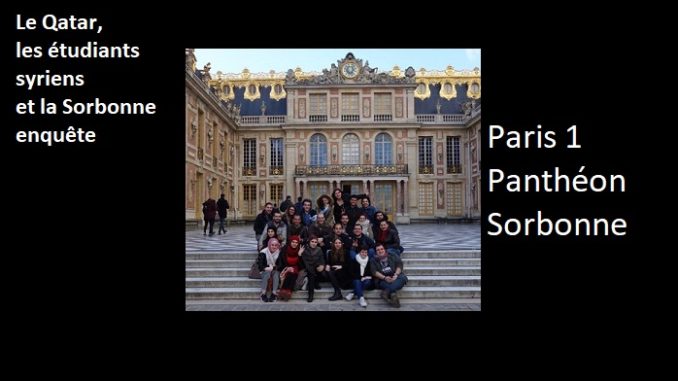
In September 2015, the Emir of Qatar publicly pledged to finance the studies of a hundred of Syrian students for 3 years in Paris 1 Panthéon-Sorbonne. This decision created prodigious hope for these young people, but did the university administration take the appropriate steps?
Were Syrians finally welcome?
Listening to some students, we were surprised by the process of recruitment that was taken as part of this help initiated by Qatar.
In the first place, not only Syrian students had been recruited. Rereading the words of the president of the university, he had taken the precaution to say « the agreement did not provide any requirement of gender, religion or even nationality for the beneficiaries. «
But the press, including us, focused mainly on the Syrians, following the polemical issue over the lack of welcoming Syrian refugees in Qatar. The Qatari press had been careful not to say that Qatar would finance other nationalities: Saudi, Afghan, Indian, Russian …
At that time, the Emir of Qatar said that this aid was a special gift for the Syrian people. So who lied therefore, the Emir Tamim bin Hamad al Thani or the administration of Paris 1?
An uneasiness that unfortunately would increase throughout our conversation.
How to explain the case of this student who had a very bad level in French yet he was accepted at the university without any french courses in order to upgrade his level? Or another one who had been accepted to a master’s degree in law at the time he has not an acquaintance with mere French words? Many spoke neither French nor English, and it was impossible for them to launch a communication Or others who have been admitted to a license degree studies when they did not have the level of B1. Others have unluckily started two months later …
The problem that confused many students, was the vehement will of the administration so that the CROUS grant would replace the scholarship of Qatar.
A total misunderstanding and annoyances that was not going to be finished.
This uneasiness weighed heavily on the results leading to several failures because of the lack of professionalism in the guidance, the lack of helping the Syrians to acquire the knowledge of the French language, or at the administrative level. We will soon be talking about the scandal of the allocation of housing closer to the place of study where other nationalities were well-privileged compared to Syrians. A scandal that will have ill-fated consequences for many Syrian students who were contemplating their future being shattered.
We have previously spoken of the tremendous hope for these young people, but did the university administration take the appropriate steps to make it work out ? Were Syrians finally welcome?
